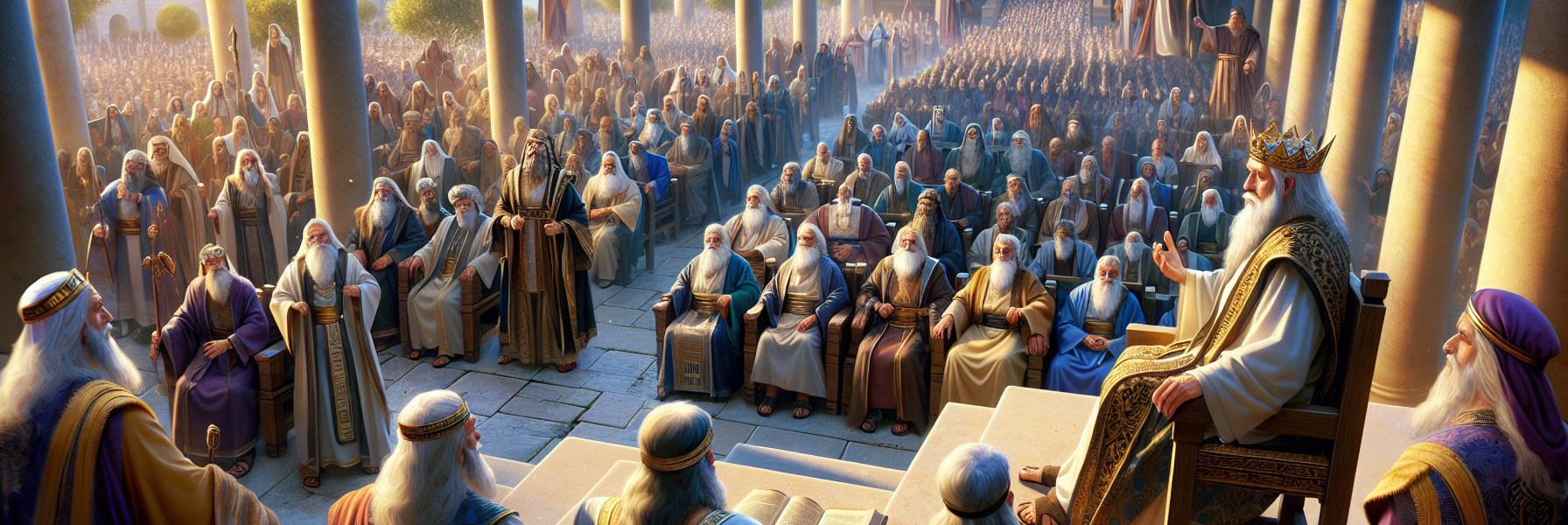**The Commissioning of the Levites**
In the golden years of King David’s reign, when the Lord had granted him rest from all his enemies and peace settled over Israel like a gentle dew, the aged king turned his heart toward the service of the Lord. The time had come to ensure that the worship of God would continue in order and beauty long after he had passed from this earth.
With great solemnity, David summoned all the leaders of Israel—the elders, the commanders, the judges, and the heads of families—to Jerusalem. The city buzzed with anticipation as the people gathered in the courts of the palace, their faces turned expectantly toward their beloved king. David, though advanced in years, stood tall, his voice still strong with the authority of one who had walked with God.
“My brethren,” he began, his eyes scanning the assembly, “the Lord has chosen us to be His people, and He has given us this land to dwell in. But above all, He has appointed the house of the Lord to be the center of our worship, the place where His glory dwells. Now, in my old age, I must ensure that the work of the sanctuary continues in righteousness and order.”
A murmur of agreement rippled through the crowd. They knew David’s heart was fixed on the Lord, and his zeal for the Temple burned brightly, even though the Lord had decreed that Solomon, his son, would be the one to build it.
David then called forward the Levites, the tribe set apart by God for the service of the sanctuary. They came in their divisions—the sons of Gershon, Kohath, and Merari—each family standing in ordered ranks before the king. The Levites had once been scattered throughout Israel, serving in towns and villages, but now David would establish them in their sacred duties with precision and reverence.
“From this day forward,” David proclaimed, “the Levites shall no longer carry the tabernacle or its furnishings as they did in the wilderness. For the Lord has given us rest, and soon His dwelling place shall be a permanent Temple in Jerusalem.”
The Levites listened intently as David outlined their new roles. Some would oversee the work of the house of the Lord, ensuring that all was done in holiness. Others would serve as officers, judges, gatekeepers, and musicians. The sons of Aaron, the priests, would offer the sacrifices, but the Levites would assist them in every sacred task.
Then David turned his attention to the divisions of the Levites, numbering them carefully. Thirty-eight thousand men, all strong and able, stood ready for service. Among them, twenty-four thousand were appointed to oversee the work of the Temple, six thousand as officers and judges, four thousand as gatekeepers, and four thousand to praise the Lord with instruments and song.
David’s heart swelled with joy as he heard the voices of the Levites rise in song, their music filling the courts with melodies of thanksgiving. He remembered how the Lord had delivered him from the hand of Saul, how He had established his throne, and now, in his final days, he rejoiced to see the worship of God set in order for generations to come.
With great care, he assigned each family its duty. The sons of Kohath, descendants of Moses and Aaron, were given the most sacred tasks, for they were of the priestly line. The Gershonites and Merarites were entrusted with the maintenance of the courts, the gates, and the storerooms. Every man had his place, every task was ordained.
As the sun set over Jerusalem, casting long shadows across the assembly, David lifted his hands in blessing. “May the Lord, the God of Israel, be with you all. Serve Him with a whole heart and willing mind, for the Lord searches all hearts and understands every plan and thought. If you seek Him, He will be found by you.”
The people bowed their heads in reverence, and a deep sense of awe filled the air. The Levites, now consecrated for their holy service, stood ready to fulfill their calling. And so, under the watchful eye of King David, the foundations of worship were laid—not in stone and mortar, but in the faithful hearts of those who would serve the Lord forever.
Thus, the work of the sanctuary was established, a legacy of devotion that would echo through the ages.




